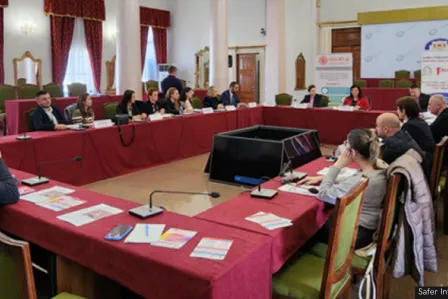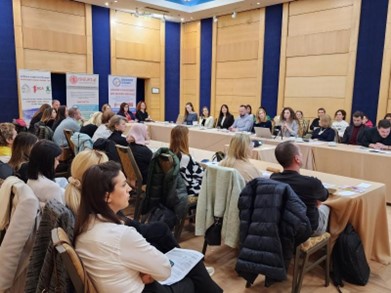In Albania, thousands of children and young people become victims of violence, bullying, abuse and crimes online every day. Only a small proportion of these incidents are reported to authorities or the National Hotline for Child Internet Safety, as most victims feel scared, ashamed or have no confidence in the authorities to report. The Albanian Parliament Child Rights Caucus (Friends of Children Parliamentary Group) held a hearing session with iSIGURT.al to discuss the matter.

Against this reality, the child protection system, education, law enforcement, and cyber security bodies are unprepared to cope with the number of online incidents. The current legal and institutional framework has serious shortfalls in protecting children and young people who become victims of online crimes in the digital space. To give some examples, the annual National Report on Child Online Safety in Albania found that:
- 244 reports of online incidents were reported to the hotline during 2023, representing a 160 per cent increase in reported online incidents.
- 62 per cent of all incidents were reported by girls and about 34 per cent by boys.
- The age group reporting most of the online incidents are adolescents aged 15-18, followed by the 18-30 and 11-14 age groups.
- TikTok and Instagram are the two main platforms where children face most online incidents, 47 and 27 per cent of cases, respectively.
For the first time since the establishment of the iSIGURT.al, online bullying is the most reported online incident, in about 35 per cent of cases.
The findings speak volumes about the new realities that children and adolescents face online. It shows that their everyday reality in families, schools and communities is being challenged by bullying, hate speech, threats and online sexual violence. They speak of an existence where communication, respect, digital skills, and culture are lacking, and where online safe spaces are missing.
At the main SID event in Albania, the 9th National Forum, leaders from the internet industry signed a national pact.
To gain a deeper understanding of Safer Internet Day and the efforts undertaken in Albania to enhance online protection, explore the following articles:
- SID Albania brings to attention the need for better online protection of children
- Albanian Parliament and iSIGURT together for the protection of children, girls and women in cyberspace. MPs join the National Pact!
- 50 celebrities and personalities support a safer internet in Albania
- iSIGURT.al published two new reports on online safety in Albania
Learn more about Safer Internet Day in Albania via its SID profile page.
In Albania, thousands of children and young people become victims of violence, bullying, abuse and crimes online every day. Only a small proportion of these incidents are reported to authorities or the National Hotline for Child Internet Safety, as most victims feel scared, ashamed or have no confidence in the authorities to report. The Albanian Parliament Child Rights Caucus (Friends of Children Parliamentary Group) held a hearing session with iSIGURT.al to discuss the matter.

Against this reality, the child protection system, education, law enforcement, and cyber security bodies are unprepared to cope with the number of online incidents. The current legal and institutional framework has serious shortfalls in protecting children and young people who become victims of online crimes in the digital space. To give some examples, the annual National Report on Child Online Safety in Albania found that:
- 244 reports of online incidents were reported to the hotline during 2023, representing a 160 per cent increase in reported online incidents.
- 62 per cent of all incidents were reported by girls and about 34 per cent by boys.
- The age group reporting most of the online incidents are adolescents aged 15-18, followed by the 18-30 and 11-14 age groups.
- TikTok and Instagram are the two main platforms where children face most online incidents, 47 and 27 per cent of cases, respectively.
For the first time since the establishment of the iSIGURT.al, online bullying is the most reported online incident, in about 35 per cent of cases.
The findings speak volumes about the new realities that children and adolescents face online. It shows that their everyday reality in families, schools and communities is being challenged by bullying, hate speech, threats and online sexual violence. They speak of an existence where communication, respect, digital skills, and culture are lacking, and where online safe spaces are missing.
At the main SID event in Albania, the 9th National Forum, leaders from the internet industry signed a national pact.
To gain a deeper understanding of Safer Internet Day and the efforts undertaken in Albania to enhance online protection, explore the following articles:
- SID Albania brings to attention the need for better online protection of children
- Albanian Parliament and iSIGURT together for the protection of children, girls and women in cyberspace. MPs join the National Pact!
- 50 celebrities and personalities support a safer internet in Albania
- iSIGURT.al published two new reports on online safety in Albania
Learn more about Safer Internet Day in Albania via its SID profile page.
- TikTok Safer Internet Centre+ (SIC+) Instagram
Related content
- < Previous article
- Next article >












